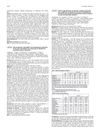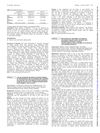 116 citations,
February 2017 in “Journal of the American Academy of Dermatology”
116 citations,
February 2017 in “Journal of the American Academy of Dermatology” JAK inhibitors help with skin conditions but need more research on dosing and safety.
 70 citations,
April 2016 in “Experimental Dermatology”
70 citations,
April 2016 in “Experimental Dermatology” A patient with alopecia areata regrew hair after taking tofacitinib and showed changes in certain blood and skin markers.
 14 citations,
January 2020 in “Mediterranean Journal of Rheumatology”
14 citations,
January 2020 in “Mediterranean Journal of Rheumatology” New JAK inhibitor drugs show promise for treating skin diseases but need more research on safety and effectiveness.
 3 citations,
May 2023 in “Clinical drug investigation”
3 citations,
May 2023 in “Clinical drug investigation” JAK inhibitors for alopecia areata are linked to minor side effects like headache and acne, but not to an increased risk of serious adverse events.
 70 citations,
October 2020 in “The journal of allergy and clinical immunology/Journal of allergy and clinical immunology/The journal of allergy and clinical immunology”
70 citations,
October 2020 in “The journal of allergy and clinical immunology/Journal of allergy and clinical immunology/The journal of allergy and clinical immunology” Janus kinase inhibitors are promising drugs for treating autoimmune and inflammatory diseases.
138 citations,
March 2021 in “Journal of the American Academy of Dermatology” Ritlecitinib and brepocitinib effectively regrow hair in alopecia areata patients.
 2 citations,
January 2023 in “Prague Medical Report”
2 citations,
January 2023 in “Prague Medical Report” JAK inhibitors, like baricitinib, are effective and safe for treating alopecia areata.
March 2024 in “Current issues in molecular biology” Personalized medicine in dermatology uses molecular biomarkers to improve diagnosis and treatment but needs further advancements for practical use.
 1 citations,
January 2023 in “Cutis”
1 citations,
January 2023 in “Cutis” The paper concludes that the new medication baricitinib needs further testing in a more diverse group of patients with alopecia areata.
 April 2024 in “Medical & clinical research”
April 2024 in “Medical & clinical research” More research is needed to find the best long-term treatments for Alopecia Areata.
 April 2024 in “Frontiers in pharmacology”
April 2024 in “Frontiers in pharmacology” Brepocitinib 30mg is most effective for moderate-to-severe alopecia areata, but ritlecitinib 50mg may offer a better balance of safety and effectiveness.
 July 2023 in “Dermatology and therapy”
July 2023 in “Dermatology and therapy” People with alopecia areata may have a higher risk of blood clots.
 May 2023 in “Journal of managed care & specialty pharmacy”
May 2023 in “Journal of managed care & specialty pharmacy” Alopecia areata causes hair loss and life quality issues; current treatments are often unsatisfactory, but new drugs like JAK inhibitors show promise.
15 citations,
January 2022 in “Immune Network/Immune network” New targeted immunotherapies are improving treatment for inflammatory skin diseases.
 2 citations,
March 2023 in “Frontiers in medicine”
2 citations,
March 2023 in “Frontiers in medicine” A 15-year-old boy's severe scalp condition improved significantly with adalimumab and baricitinib treatment.
 489 citations,
November 2021 in “Signal Transduction and Targeted Therapy”
489 citations,
November 2021 in “Signal Transduction and Targeted Therapy” The JAK/STAT pathway is important in cell processes and disease, and JAK inhibitors are promising for treating related conditions.
 40 citations,
August 2022 in “Frontiers in immunology”
40 citations,
August 2022 in “Frontiers in immunology” Blocking JAK/STAT pathways can help treat hair loss from alopecia areata.
 March 2024 in “Clinical, cosmetic and investigational dermatology”
March 2024 in “Clinical, cosmetic and investigational dermatology” Upadacitinib may effectively treat alopecia areata without side effects.

Tofacitinib may effectively treat hair loss and improve symptoms in autoimmune conditions like alopecia areata and Sjögren's syndrome, but long-term treatment might be necessary.
 10 citations,
January 2023 in “Acta dermato-venereologica”
10 citations,
January 2023 in “Acta dermato-venereologica” Baricitinib and deuruxolitinib are effective for treating alopecia areata, but their efficacy depends on the dose.
 January 2024 in “American journal of clinical dermatology”
January 2024 in “American journal of clinical dermatology” Ritlecitinib is safe and well-tolerated for treating alopecia areata in patients aged 12 and older.
 1 citations,
June 2023 in “Dermatology and therapy”
1 citations,
June 2023 in “Dermatology and therapy” People with Alopecia Areata have more herpes simplex infections but similar rates of cancer, blood clots, and heart disease compared to those without it.
 April 2024 in “Journal of asthma and allergy”
April 2024 in “Journal of asthma and allergy” Abrocitinib effectively treated severe atopic dermatitis and mild alopecia areata in a 12-year-old boy after dupilumab failed.
 August 2024 in “Clinical Cosmetic and Investigational Dermatology”
August 2024 in “Clinical Cosmetic and Investigational Dermatology” Upadacitinib and narrowband UVB effectively treated a child's vitiligo and alopecia areata.
 June 2016 in “Annals of the rheumatic diseases”
June 2016 in “Annals of the rheumatic diseases” Methotrexate is effective for treating rheumatoid arthritis but requires regular monitoring.
 January 2025 in “International Journal of Molecular Sciences”
January 2025 in “International Journal of Molecular Sciences” Psoriasis involves immune and genetic factors, and understanding these can improve treatments.
 June 2019 in “Poster presentations”
June 2019 in “Poster presentations” Most patients with rheumatoid arthritis continued methotrexate treatment over two years, but those who stopped and restarted experienced more side effects and less improvement.
 55 citations,
October 2019 in “Dermatology and therapy”
55 citations,
October 2019 in “Dermatology and therapy” Drugs targeting the JAK/STAT pathway can improve atopic dermatitis but vary in effectiveness for vitiligo and alopecia areata, with generally mild safety concerns.
 51 citations,
November 2013 in “Drug Discovery Today”
51 citations,
November 2013 in “Drug Discovery Today” Small molecule drugs show promise for advancing regenerative medicine but still face development challenges.
 3 citations,
December 2022 in “Cells”
3 citations,
December 2022 in “Cells” Cannabinoids like CBD and THC may help treat non-cancer skin diseases, but more research is needed.



























